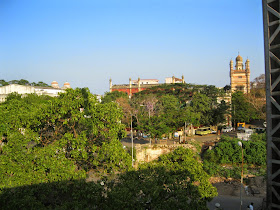Mr S Muthiah, who has written a history of Madras, Madras Discovered, and is founder of Madras Musings and chief instigator of the Madras Day celebrations, gave the first Sir S Subramanya Aiyar lecture at the University of Madras. Title: "India's First Modern City." This began with a photo of the statue of S Subramanya Aiyar, whom I and the students at the lecture did not recognize or know. He had been the first Indian Vice-Chancellor of a university - Madras University. He persuasively argued that Madras should be the considered the first modern city of India (not Calcutta).
He recently gave another version of this lecture at a TIE meeting during the Madras Day celebrations in August, 2014. Here is a brief summary.
Madras was "No man's sand"! Fort St George was founded on a strip of sand between the Portuguese settlement at San Thome and the Dutch settlement in Tiruvorriyur. The place was chosen as a good place to buy Indian made cotton textiles, for sale in England. Sir Francis Day was allowed to build the fort by the local chieftain, Darmala Venkatadri, Nayak of Poonamalee.
The English East India company had no interest in empire, they only wanted trade. Pondichery French Governor Dupleix's ambition stoked by his wife Jean Begum, really prompted the colonial ambitions of their rivals, the English. After a war, of which most Indians are ridiculously unaware, the French captured Madras but returned to English in exchange for Quebec, a province of Canada, as part of the Treaty of Aix-le-Chapelle.
(Mr Muthiah thinks the English got the better end of the deal. But I think the French needed Quebec for its forests, as they were running out of firewood. England had plenty of coal. And the cotton revolutions of John Kay's shuttle, Hargreave's spinning jenny etc had not yet happened, so England really needed Madras textiles.)
The several firsts for which Madras can be proud of, and entitling it to the claim as the first modern city of India, listed here.
Major Stringer Lawrence started the Madras regiment, the basis of the Indian army. This was after the ridiculous ease with which the French won the Adayar war.
Governor Charles Trevelyan started the Indian civil service before Britain got one.
He recently gave another version of this lecture at a TIE meeting during the Madras Day celebrations in August, 2014. Here is a brief summary.
 |
| Sir S Subramanya Aiyar, First Indian Vice Chancellor |
 |
| St George - a portrait from St Mary's Church, Armenian Street |
The English East India company had no interest in empire, they only wanted trade. Pondichery French Governor Dupleix's ambition stoked by his wife Jean Begum, really prompted the colonial ambitions of their rivals, the English. After a war, of which most Indians are ridiculously unaware, the French captured Madras but returned to English in exchange for Quebec, a province of Canada, as part of the Treaty of Aix-le-Chapelle.
(Mr Muthiah thinks the English got the better end of the deal. But I think the French needed Quebec for its forests, as they were running out of firewood. England had plenty of coal. And the cotton revolutions of John Kay's shuttle, Hargreave's spinning jenny etc had not yet happened, so England really needed Madras textiles.)
The several firsts for which Madras can be proud of, and entitling it to the claim as the first modern city of India, listed here.
Governor Charles Trevelyan started the Indian civil service before Britain got one.
St George's school and orphanage on Poonamallee high road based on their earlier versions in Fort St George, first model of European education in Asia and continues to be the model for school in India today.
Governor's bank - first operating in Fort St George - later became Bank of Madras, then merged with banks of Calcutta and Bombay to become Imperial bank which later became State Bank of India.
A hospital to help sick lads became General Hospital.
In 1688 first Municipal corporation outside England started.
The Oldest library belongs to the Madras Literary Society, which saw several firsts under FW Ellis.
Armenians, exiled form Persia, came as traders and traded from West Asia to Philippines. Armenian constitution was drafted in madras!
Coral merchant street was where Jews lived.
Chepauk palace built by Nawab Of Carnatic on money borrowed from EIC which debt was written off by transfer of nawab's lands from Ganjam to Kanyakumari: this was the true beginning of British empire.
 |
| Chepauk Palace - which gave EIC an empire! |
 |
| Ripon Building - the first Indian municipal corporation |
College of Ft St George replaced by Haylebury college, for training civil servants.
College of Engineering (started as Survey college) Guindy. Presidency college in 1857.
Oldest school of Art and oldest veterinary college. Oldest postal system. St. Andrews Kirk built on traditional well foundation, traditional Indian design.
Parry's, the second oldest company in India, built by Dare.
Spencer's was the largest retail empire in Asia. They ran 450 railway restaurants and catered to all trains.
The call for satyagraha went from Madras when the Rowlatt act was passed.
Some Links
1. Adayar War
2. அடையாறு போர்
3. The Seven Year's War - a video
4. College of Fort St George - FW Ellis
 |
| Madras Literary Society - the first library |
 |
| Armenian Church in Georgetown |

How many indian rastaurant converted into modern indian restaurant? and waht are the Madra's best foods or recipes? Is that known out of the town?
ReplyDeleteInformative.
ReplyDeleteBut need more infos on the questions posed on your post